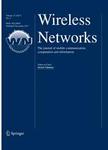版权所有:内蒙古大学图书馆 技术提供:维普资讯• 智图
内蒙古自治区呼和浩特市赛罕区大学西街235号 邮编: 010021

作者机构:Univ Isfahan Dept Informat Technol Engn Esfahan Iran
出 版 物:《WIRELESS NETWORKS》 (无线网络)
年 卷 期:2015年第21卷第1期
页 面:21-34页
核心收录:
学科分类:0810[工学-信息与通信工程] 0808[工学-电气工程] 0809[工学-电子科学与技术(可授工学、理学学位)] 08[工学] 0812[工学-计算机科学与技术(可授工学、理学学位)]
主 题:Quality of experience Distributed channel assignment Self-organized management IEEE 802.11
摘 要:One of the challenging problems with deployment of IEEE 802.11WLANs in the same hotspot is assignment of appropriate channels to the Access Points (APs). As the number of channels in IEEE 802.11 is limited and most of them are partially overlapping, proper reuse of such channels is a complex optimization problem with respect to the traffic load and Quality of Service (QoS) requirements. Previous methods mostly employ the estimated number of interfering clients or the interference level that is measured by the AP as the main decision parameter, without regarding the actual interference imposed to the clients and their QoS requirements. Quality of Experience (QoE) is defined as the overall acceptability of the service as perceived by the user and can be exploited as a new metric which not only reflects the impairments (such as interference) imposed to the traffic, but also represents the user/service requirements. In this paper, a novel performance index, which takes into account both the aggregate QoE and the user-level fairness, is defined and channel assignment is formulated as the optimization problem on maximizing this index. Two novel distributed channel assignment algorithms are presented that exploit the QoE measure of associated clients to locally solve the optimization problem using Learning Automata mechanism. The proposed methods have been analyzed and compared to the famous Least Congested Channel Scan method by simulations where the results have shown superior performance in term of defined performance index.